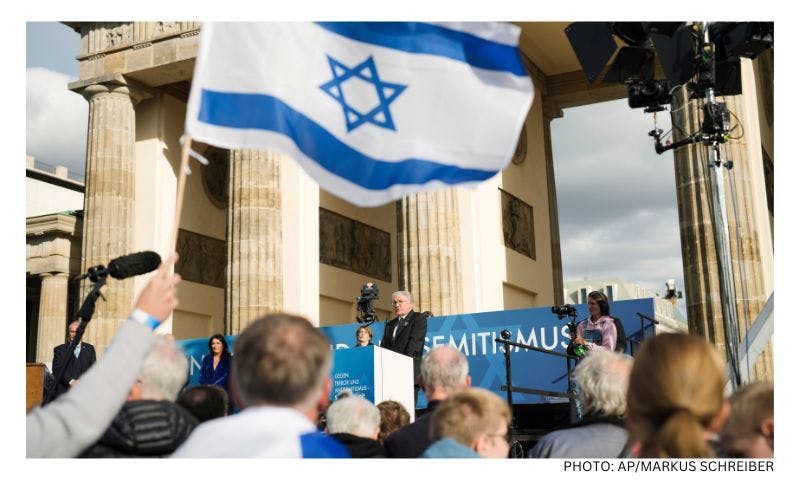Published: 18 February 2022
Last updated: 26 February 2024
CLIVE LAWTON: So far, neither Orthodoxy nor Progressive Judaism has got it right
WHEN DOES THIS story start? Not the one about oranges on seder plates –we’ll come back to that later, but the one about the place of women in Jewish life.
I could go back to the patriarchs and matriarchs where the women often secured key developments. Or the truly mysterious moment when Zipporah saves Moses her husband’s life by circumcising their son. Or Esther, or Salome, or Bruriah, or Rashi’s daughters – but I won’t. I’m going to start this story for our purposes in 1935.
That was the year that Regina Jonas became the first woman rabbi ever - in Berlin. She passed the necessary exams in 1930 but it was only five years later that a Liberal Rabbi decided to examine her (again!) and award her semikha, rabbinic status.
Even then though, she could not find a pulpit and she spent her remaining years working as a chaplain or in unofficial roles. When she was deported to Teresin, she wrote and delivered more than 20 sermons and performed a quasi–rabbinic role.
Sadly though and like so many others, she was killed in Auschwitz in 1944 at the age of 42. But in subsequent years none of the 520 who lectured in Teresin, including those with whom she worked, mentioned her name.
It was only in the 1980s that one of her students mentioned her and in the 90s that her writings, including her rabbinic thesis, ‘Can Women become Rabbis according to Halakha?’ were finally published.
Why do I tell you all of this?
It’s because my theme in this series on splits that deeply challenge the Jewish People today relates to the role of women.
As is so often the case in Jewish matters, the community and its leaders sit uncomfortably on the great split that opened up in the 19th century ushered in by the Enlightenment. Are the Jews a classical or a modern people? Put differently, is modernity or are classical frames the form that fits Jewish ways most suitably?

There’s an awful lot of sociology masquerading as halakha. For example, there’s nothing to stop women touching a sefer Torah.
No matter more starkly exposes this issue than the role of women. Is the Jewish way to allow each person their own untrammelled choice to personal fulfilment or does the community – not to mention the family – require that we perform a role in the greater whole before considering our own satisfaction?
Remember Fiddler on the Roof? ‘Tradition! Who day and night must struggle for a living’ etc? Each person needs to play their part as given for the smooth running of a coherent community. Contemporary Orthodox Jews argue that it is perfectly acceptable for both women and men to seek whatever fulfilment they wish in the secular aspects of their lives, for example, to pursue their careers to the highest level they can.
But in the Jewish dimensions, there are clear role definitions - women light the candles while men lay tefillin. (Men can light candles and women can wear tefillin, but they can’t take the job away from the one who has to do it.) And in case that sounds strangely benighted to Progressive Jews, my experience suggests that it remains true that candle lighting is mostly done by women!
But generally, Progressive Judaism has asserted that there should be no distinctions and that men and women should have fully equal functions and choices – resulting, for example, in the slightly strange fact that girls have to wait a year for boys to catch them up so that they can both be Bnei Mitzvah at 13.
Of course, there’s an awful lot of sociology masquerading as halakha. For example, there’s nothing to stop women touching a sefer Torah. If there is a mekhitza, a divider between men and women in shul, it doesn’t need to make women invisible. Women can say hamotzi (the blessing on the bread) just as well as men can.
The Talmud of course is always more subtle than most people give it credit for. It recognised several genders and intersexuality and struggled to fit such realities into its worldview. But the classical world believes in definable roles and the need for people to abide by them. Overall and for the sake of simplicity, women are one thing and men are another.
Is the Jewish way to allow each person their own choice to fulfilment or does the community require that we perform a role in the greater whole?
In support of such a view, I doubt there’s a baby born in the world for whom the first question other than ‘is it healthy?’ is ’Is it a boy or a girl’?’ Even if we have little patience with pink and blue nonsense, most people define gender pretty early.
It took even Progressive Jews about 30 years to appoint their next female rabbi after Regina Jonas so it wasn’t obvious to them either.
Going forward, the deal is not done. Earlier this year, one of the faculty of the London School of Jewish Studies completed her semikha studies at a somewhat maverick but indisputably Orthodox yeshiva in New York.
Though she agreed not to use the title ‘Rabba’ or ‘Rabbi’ she had her role as a research and teaching fellow summarily withdrawn because an Orthodox establishment could not accommodate a woman who demonstrated her ‘un-Orthodoxy’ by accepting semikha in this way.
There was more outrage expressed from within the Orthodox community than obviously the powers-that-be had expected, from both men and women. After a couple of months of holdout, she was reinstated. Though she doesn’t insist on the title, that’s how everyone now calls her.
But she wasn’t the first. Among others, the wife of a Chabad rabbi also obtained semikha through the same institution a couple of years ago, and now a woman has been appointed as the ‘spiritual head’ (rabbi?) of an Orthodox community in Israel.
Of course, the Haredi world is not going there (yet?) but that’s the subject of another article in a month or two.
But right now, the story is not yet played out. Whether or not the gender binary will survive into the 22nd century remains to be seen anyway, but how the Jewish world finesses the stresses of retaining the resilience of classical forms under the pressure of modern challenges is nowhere better illustrated than in the issue of the status and place of women in Jewish practice.
In my view, and no doubt many will disagree, neither Orthodoxy nor Progressive Judaism has got it right yet.
Artwork: Avi Katz




